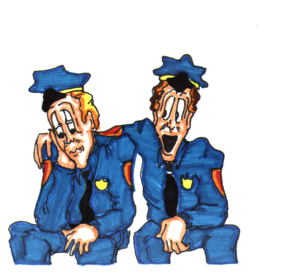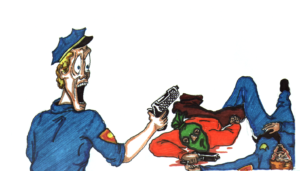Police Psychology | Hanukkah Wishes and Communication
by Gary S. Aumiller, Ph.D. ABPP
 Thin Blue Mind / Smokey Heroes
Thin Blue Mind / Smokey Heroesby Lt. Jason Childers, Texas
by Gary S. Aumiller, Ph.D. ABPP
My very first job and first elected office, I was voted president of the Mighty Mouse Club by the kids in my neighborhood. Mighty Mouse was a cartoon  super hero mouse character that beat up cats in the 40’s 50’s and early 60’s. The club members talked behind my back and all got a penny from their parents and each gave me a penny for my being the president. I was so honored. They didn’t tell me I was going to be paid! I remember I was about kindergarten age at the time. I remember I snuck to the ice cream truck when it came by later in the day, and I spent that seven cents on seven ice cream cones and gave one to each of the seven kids in the club. I remember I didn’t order one for myself because I didn’t think I had enough money, but the ice cream man gave me one anyway. (When I look back, my mother probably really paid for the cones, she had to watch while I went into the street). I thought I was doing something that made all the kids happy. I remember a girl named Margery, who lived two doors down from me, saying before we left that day that it was the best club in the whole world.
super hero mouse character that beat up cats in the 40’s 50’s and early 60’s. The club members talked behind my back and all got a penny from their parents and each gave me a penny for my being the president. I was so honored. They didn’t tell me I was going to be paid! I remember I was about kindergarten age at the time. I remember I snuck to the ice cream truck when it came by later in the day, and I spent that seven cents on seven ice cream cones and gave one to each of the seven kids in the club. I remember I didn’t order one for myself because I didn’t think I had enough money, but the ice cream man gave me one anyway. (When I look back, my mother probably really paid for the cones, she had to watch while I went into the street). I thought I was doing something that made all the kids happy. I remember a girl named Margery, who lived two doors down from me, saying before we left that day that it was the best club in the whole world.
I had a conversation this week with an officer from a Midwest state who called me out of the blue. He said he was a reader and that he wanted to get it across to his superiors that morale was very low and the trainings they are having don’t seem to address this issue or things that were important to the officers. He said there has been a little bit of research in their department that showed that job satisfaction was in the low 20 percentiles and that was a major issue. It was heart wrenching to have a guy say that 80 percent of his department isn’t crazy about their job anymore, a job many of them probably dreamed of taking. He asked me how do I get a training on something that really mattered to his officers doing the job.
I personally have seen low morale across the country lately and want to spend a couple of paragraphs to address this issue. (more…)
Nancy K. Bohl-Penrod, Ph.D., San Bernardino, Calif.
Peer support has been around for ages. In the 1950’s and 1960’s peer support programs began to emerge at the Chicago Police department, the Boston Police department and NYPD. They called those willing  to be in the program “peer counselors”. The programs were originally created, because of the increase in alcohol abuse and the disciplines surrounding the abuse. Their programs followed the Alcoholics Anonymous 12-step program. The peer counselors (supporters) were in “recovery” and it was assumed the best fit to help others with their alcohol problems.
to be in the program “peer counselors”. The programs were originally created, because of the increase in alcohol abuse and the disciplines surrounding the abuse. Their programs followed the Alcoholics Anonymous 12-step program. The peer counselors (supporters) were in “recovery” and it was assumed the best fit to help others with their alcohol problems.
In the 1980’s, formalized, official, peer support programs were developed by LAPD, the San Bernardino Sheriff’s department and the Long Beach police department. It was at this time they changed their names from “counselors to supporters” because it appeared misleading. They were originally set up to assist existing mental health services. Those designated peer supporters would help recognize those officers who were having personal and emotional problems. Similar to an “early detection” program. These departments and their mental health providers, quickly realized the advantages to having trained peer support officers be immediately available. (more…)
by Adam Pasciak PhD, LP, Clarkston, Michigan
Over the years a few people have asked me what is was like to get shot. To get it out of the way here, it hurt a lot—at first—but then when you start going into shock that helps. Having said that, I don’t recommend it.
As to how it was I got into the situation I ended up  in, it was a “routine stop”. My partner and I had pulled over a truck for a minor traffic offense and during the encounter noticed several gun stickers on the truck (not especially unusual in our city) and some odd behavior from the driver. Something about the man led to me wanting to have him exit the truck. As he did so I attempted to pat him down—which was when it went from “routine” to all hell breaking loose. (more…)
in, it was a “routine stop”. My partner and I had pulled over a truck for a minor traffic offense and during the encounter noticed several gun stickers on the truck (not especially unusual in our city) and some odd behavior from the driver. Something about the man led to me wanting to have him exit the truck. As he did so I attempted to pat him down—which was when it went from “routine” to all hell breaking loose. (more…)